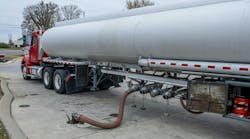The Dept. of Transportation's Inspector General (IG) says that federal standards and state controls are not sufficient to guard against people fraudulently obtaining CDLs. Calling it an ‘alarming threat’ to the nation's well-being, the IG says that while FMCSA has recognized the need to tighten licensing, it hasn't followed through with any specific fixes.
The CDL issue has been vexing for FMCSA during the past several years as the public witnessed wave after wave of criminal prosecutions for operations of so-called ‘license mills.’ According to the IG, since 1998, suspected fraud in the testing and licensing of commercial drivers has been identified in 16 states.
This includes CDL improprieties with over 900 drivers in Illinois and Florida who obtained fraudulent licenses and transferred to other States. In 2000, a third-party examiner in Georgia was accused of illegally selling over 500 CDLs. After Sept. 11, the Justice Department released a list that included 22 people indicted for obtaining fraudulent CDLs to transport hazardous material.
In the past, fake licenses may have posed a threat to others on the road as unqualified drivers hit the pavement, but now federal officials are concerned that these licenses may be in the hands of terrorists who will use trucks as direct weapons or part of another terrorist attack.
Security officials at truck carriers have expressed impatience with DOT's slow pace on the CDL and other security issues. “understand that airline security comes first because of its high profile, but we're waiting for guidance,” says one carrier official. He says the U.S.A. Patriot Act calls for background checks for hazmat-endorsed drivers, but so far FMCSA has not issued guidelines. One point of contention is who will do these background checks. Carriers want direct access to government files so they can process checks quickly and cheaply, while federal agencies resist this notion.
“In the meantime,” says the carrier official, “nothing is being done.” Some carriers have begun doing their own background checks through third parties, such as state police, but usually only on new hires as a condition of employment. There are legal issues (read: fear of lawsuits) involved with background checks of current drivers. A federal mandate would alleviate this problem.
At a recent meeting of the National Private Truck Council, FMCSA Administrator Joseph Clapp said that the agency's visits to more than 40,000 carriers that handle hazardous materials netted 126 names of people who were referred to the FBI for follow-up. These people, most of whom were not drivers, fell under suspicion because of irregularities or inconsistencies in their job applications, aberrations with citizenship papers or other anomalies. The FBI would not comment on whether or not they have investigated this list of people.
Clapp reiterated that the agency would soon issue regulations about background checks for drivers hauling hazardous materials, but many are saying this action does not go far enough. Private security officials contend that hazmat trucks are only one threat and that large trucks carrying explosives are just as deadly. “Why check only hazmat drivers?” said one analyst. “Isn't a Class 8 truck carrying explosives just as potent a threat?”
The IG had several specific suggestions for FMCSA that might reduce this threat. Its report noted that only four of the 13 states required applicants to show they are U.S. citizens or legal residents and only one required proof of state residency. One simple fix, the IG said, would be for CDL applicants to show proof of state residency and U.S. citizenship or legal alien status and that states check applicant social security numbers against government records to make sure they are valid.
These and other steps would go a long way, security experts say, to keep terrorists from getting behind the wheel.


